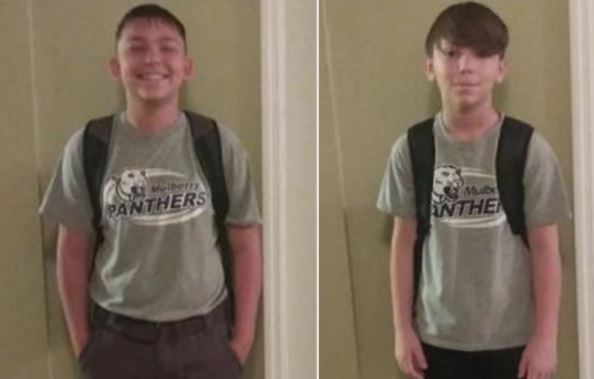The Supreme Court of Florida today, May 22, 2025, affirmed the convictions and death sentences of Mark Howard Wilson for the 2020 first-degree murders of his girlfriend’s young nephews, 12-year-old Robert Baker and 14-year-old Tayten Baker.
The court’s decision found no reversible error in Wilson’s trial or sentencing for the killings, which occurred on August 26, 2020, in Putnam County. The boys were found brutally murdered in their home, having been beaten with a hammer and their throats cut.
Wilson was the boyfriend of the victims’ maternal aunt, Cynthia Guinan.
Wilson, Guinan, and their young daughter had moved into a shed on the Baker family’s property just five days before the murders at the insistence of the boys’ mother, Sarah Baker, due to concerns about their previous living conditions.
The Murders and Investigation
According to court documents, Sarah Baker discovered her sons’ bodies on the morning of August 26, 2020. Investigators later found a hammer and a fillet knife, believed to be the murder weapons, hidden on the property. A handwritten note from Wilson expressing love for his girlfriend and daughter was also found.
A key turning point in the investigation came when Wilson confessed to the murders to his mother, Chrisy Adkins, who then cooperated with law enforcement. In a recorded conversation, Wilson detailed a plan with Guinan to kill the boys, alleging he would murder Robert and Tayten while Guinan would kill Sarah Baker and her youngest son.
READ: Florida Death Row Inmate Demands New Look At “Flawed” Case
Wilson later confessed to law enforcement, admitting to using a hammer and knife in the attacks. He claimed he believed the boys were abusing his and Guinan’s daughter, K.W., and possibly Guinan herself, though investigators found no evidence to support these allegations.
Forensic evidence linked Wilson to the crimes, with Tayten’s blood and DNA found on Wilson’s hammer, and DNA from both boys on his fillet knife.
A blood-stained sweatshirt Wilson wore contained DNA from both victims and himself. Autopsies revealed the horrific nature of the injuries, with both boys suffering multiple stab wounds, deep neck lacerations, and severe blunt force trauma to the head consistent with hammer blows.
Wilson’s Appeals and the Court’s Rulings
Wilson raised numerous issues on appeal, all of which were rejected by the Supreme Court.
One of Wilson’s primary arguments concerned the “cold, calculated, and premeditated” (CCP) aggravating factor. He contended that jury confusion during guilt-phase deliberations regarding premeditation should have precluded the CCP aggravator in the penalty phase.
However, the Supreme Court found that a general guilty verdict for first-degree murder allowed the State to pursue CCP and that the jury’s unanimous finding of CCP in the penalty phase demonstrated they ultimately concluded the murders were premeditated. The trial court had noted Wilson sharpened his knife the night before and changed weapons during the murders.
READ: Deadly Fortnite Dispute In Florida: Stepfather Shoots Stepson Multiple Times In The Back
Wilson also claimed the trial court erred in rejecting mitigating evidence that he was intoxicated by methamphetamine at the time of the murders. The Supreme Court upheld the trial court’s finding that there was “scant proof” of intoxication, with contemporaneous observations indicating he was not impaired. While Wilson claimed memory loss, he could recall other details from that morning with clarity.
Other arguments dismissed by the court included:
- Victim Impact Evidence: Wilson argued that testimony about past traumas to the victims’ family was improperly admitted. The court found the trial court did not abuse its discretion, as the testimony helped explain the context of the family’s loss.
- Jury Instructions: Wilson challenged the denial of special jury instructions regarding the meaning of a life sentence, mercy, and sympathy. The Supreme Court found the standard instructions given were adequate.
- Proportionality Review: Wilson asked the court to reconsider its decision in Lawrence v. State, which abandoned comparative proportionality review of death sentences. The court declined, reaffirming its stance.
- Constitutional Challenges: Wilson argued Florida’s death penalty scheme fails to adequately narrow the class of eligible persons, that death-qualifying a jury is unconstitutional, and that the death penalty itself is unconscionable. These arguments were rejected based on established precedent.
The jury had unanimously found multiple aggravating factors for both murders, including that Wilson was previously or contemporaneously convicted of another capital felony, the murders were committed during a burglary, and the CCP aggravator.
For Tayten Baker’s murder, the jury also found the capital felony was especially heinous, atrocious, or cruel. The jury recommended death sentences for both murders, which the trial court imposed.
In its conclusion, the Supreme Court stated, “Having reviewed each of Wilson’s claims, we affirm the judgments of conviction and sentences, including the sentences of death.”
Please make a small donation to the Tampa Free Press to help sustain independent journalism. Your contribution enables us to continue delivering high-quality, local, and national news coverage.
Connect with us: Follow the Tampa Free Press on Facebook and Twitter for breaking news and updates.
Sign up: Subscribe to our free newsletter for a curated selection of top stories delivered straight to your inbox.

